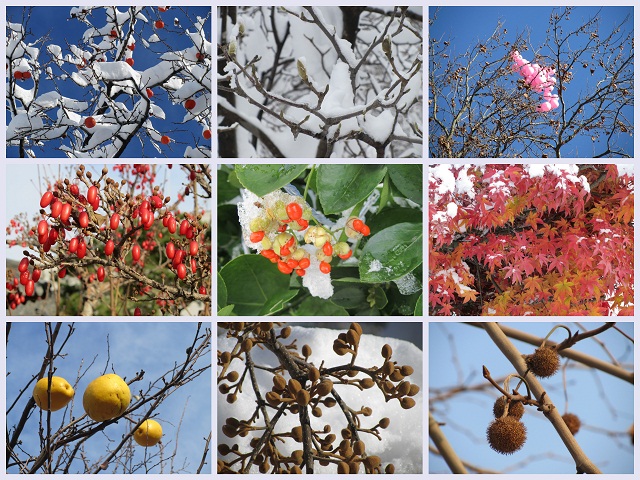Season's Greetings from China
Merry Christmas and Happy New Year - С Рождеством и Новым Годом! - Bon Nadal i Bon Any Nou! - Prettige Kerstdagen en Gelukkig Nieuwjaar! - 圣诞节快乐!
Where I come from we don't celebrate Christmas but New Year is the most important festival of the year. There is a lot of food, Soviet champagne and vodka, and people eat, drink and party for at least a couple of days. There is a New Year tree in almost every home and kids find their presents under its branches on the first morning of the new year. The presents are delivered by Father Frost - the Russian-speaking colleague of Santa Claus - who is always accompanied by his grand-daughter, a beautiful young girl called Snegurochka (or Snowgirl). After the normal New Year is celebrated, the festival fever continues till the so-called Old New Year, which is widely celebrated in the former USSR on January 14th and marks the arrival of new year according to the old Julian calendar, but in essense is just another calendar excuse to drink and have fun.
Where Jordi comes from, both Christmas and New Year are important festivals, but in addition to these two there are a couple more holidays, with food being the main theme of all the festivals. For Christmas, a plentiful and long family lunch stretches from lunch till dinner time, after which it's very common for people to go out in order to join a popular game called Qinto (like bingo but more fun). The next day, St. Esteve is another national holiday, and once again the focus is on eating. This one is closely followed by New Year, with another big dinner shared with either family or friends. The New Year holiday cycle is closed by the so called Three Kings festival honouring the Magi - wise men who visited Jesus after his birth, bearing gifts of gold, frankincense and myrrh. Almost every Spanish city or town organises cabalgatas (parades) in the evening, in which the kings and their servants parade and throw sweets to the children (and parents). Next day there is another - and final - big family dinner and kids get a second set of presents.
In Holland, where we lived for four years, people celebrate both Christmas and New Year. As to New Year, it's the most deafening but also spectacular version I've had so far, because of all the fireworks people light in the streets. And there is another really charming festival around the year's transition (celebrated on December 5th) called Sinter Klaas which for many children in The Netherlands is one of the main events of the year. During Sinterklaas the Dutch colleague of Santa Claus arrives from Spain on a steamship and uses help of Black Peters (Zwaarte Pieten) to deliver presents to kids.
In Japan where I lived for half a year people don't celebrate Christmas but do greet the New Year by going to a Shinto shrine around sunrise to hear a big bell ring 108 times (one for each type of sins that according to Buddhist beliefs people have accumulated over the past year), eat sushi, mochi and other delicious foods, and give presents to each other.
In Muslim Brunei where we spent Christmas last year, people don't celebrate either Christmas or Western New Year, but the citizens of this peaceful Sultanate did wish us Merry Christmas and we even got a bunch of bananas as a Christmas gift from a local market seller :-)!
In China where we are now Western New Year is not celebrated, but Chinese New Year - also known as Spring Festival - is so important that the whole country gets two weeks off around its celebration (we are really looking forward to experiencing it next year). As to Christmas, most people have heard of it and some are even starting to celebrate it, but for the absolute majority of Chinese families it's just another day (this year - just another shopping Sunday). We were lucky though, as our teacher's family is Christian and they invited us to attend their Christmas service, during which the whole parish (us included) shared a meal right inside their improvised church. It was a really special experience!
When you think about it, there is a huge part of the world where people don't celebrate either Christmas or Western New Year, but there are other important festivals during which people get together for long and multiple dinners and exchange presents. But there is one apparent trend in all these festival traditions - cultures often quite eagerly embrace other cultures' festivals. Examples of this trend would be Japanese people celebrating St Valentine's Day, or people in Belarus and China gradually starting to celebrate Christmas. And it's only natural: who wouldn't want to have more festivals in a year? After all, festivals are for having fun, or - if fun is not your thing - a chance to have an extra day off. If I were to decide, my around-New-Year schedule would look like this: Sinter Klaas, Western Christmas, Western New Year, Three Kings, Orthodox Christmas, Old New Year.
Cultures differ as to which holidays people celebrate, but there is one thing that's universal: most people, irregardless of ethnicity and religion, like festivals and festivals are usually about eating, drinking and other forms of happy indulgence. So we wish you all to have a lot of fun celebrating whatever it is that you celebrate (how about the above 6-festival schedule I compiled based on the festivals of Belarus, Spain and Holland? :-) and all the best in the coming 2012 year!
Season's Greetings from Olga and Jordi!
All the below pictures were taken in the past two weeks. It's amazing how all these fruits, berries, buds and leaves can survive in temperatures below zero (only the pink baloons don't raise any questions :-) Click on the image for a larger version.
